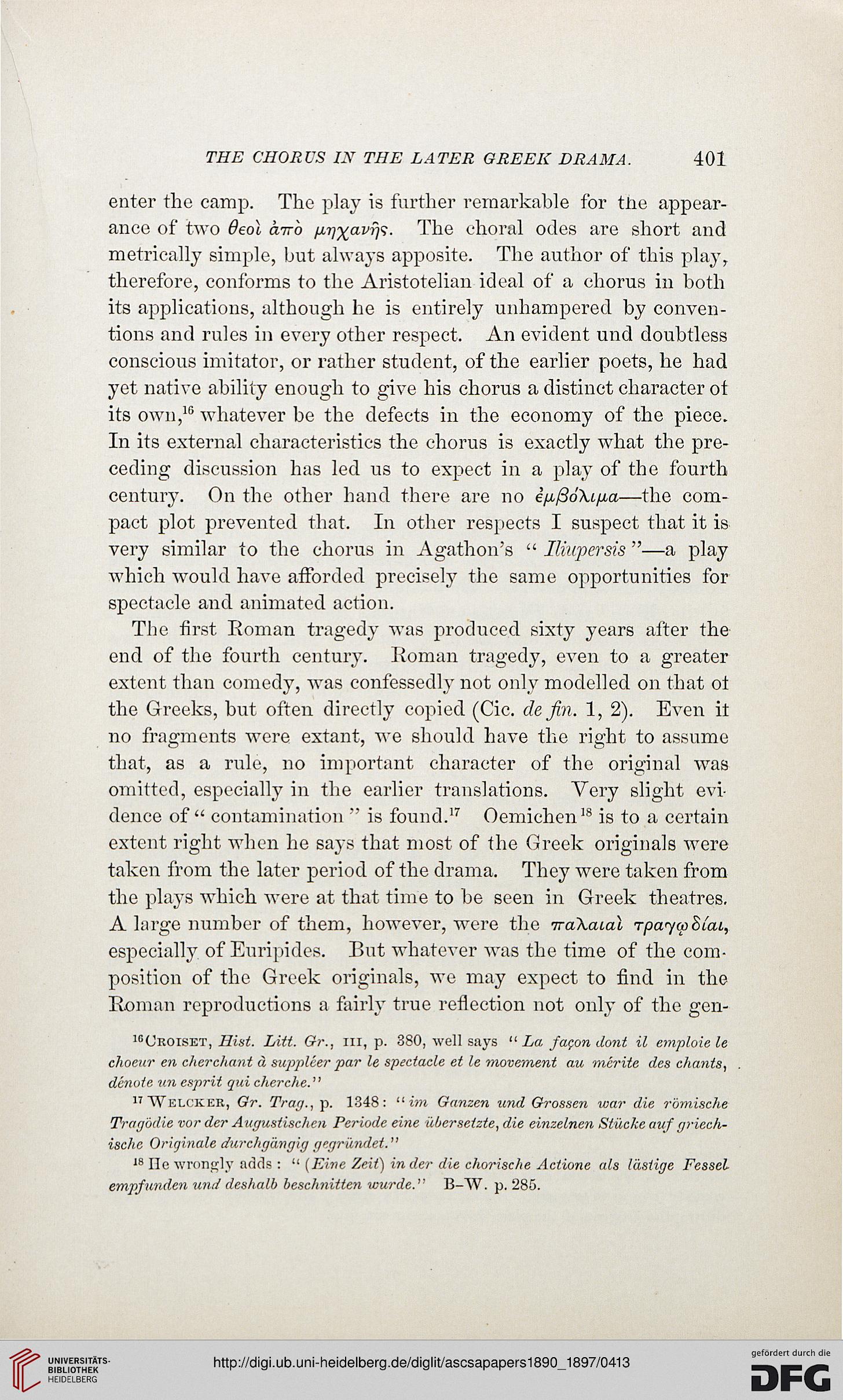THE CHORUS IN THE LATER GREEK DRAMA.
401
enter the camp. The play is further remarkable for the appear-
ance of two Beol cnrb [in^avrfi. The choral odes are short and
metrically simple, but always apposite. The author of this play,
therefore, conforms to the Aristotelian ideal of a chorus in both
its applications, although he is entirely unhampered by conven-
tions and rules in every other respect, An evident und doubtless
conscious imitator, or rather student, of the earlier poets, he had
yet native ability enough to give his chorus a distinct character of
its own,16 whatever be the defects in the economy of the piece.
In its external characteristics the chorus is exactly what the pre-
ceding discussion has led us to expect in a play of the fourth
century. On the other hand there are no e^oXi^a—the com-
pact plot prevented that. In other respects I suspect that it is
very similar to the chorus in Agathon's " Iliupersis "—a play
which would have afforded precisely the same opportunities for
spectacle and animated action.
The first Roman tragedy was produced sixty years after the
end of the fourth century. Roman tragedy, even to a greater
extent than comedy, wTas confessedly not only modelled on that ot
the Greeks, but often directly copied (Cic. de fin. 1, 2). Even it
no fragments were extant, we should have the right to assume
that, as a rule, no important character of the original was
omitted, especially in the earlier translations. Very slight evi-
dence of" contamination " is found.17 Oemichen18 is to a certain
extent right when he says that most of the Greek originals Avere
taken from the later period of the drama. They were taken from
the plays which were at that time to be seen in Greek theatres.
A large number of them, however, were the ■n-aXaial rpaywSt'ai,
especially of Euripides. But whatever "was the time of the com-
position of the Greek originals, we may expect to find in the
Roman reproductions a fairly true reflection not only of the gen-
I6Croiset, Hist. Litt. Gr., m, p. 380, well says " La facon dont il emploie le
choeur en cherchant d supplier par le spectacle et le movement au mcrite des chants,
denote un esprit qui cherc/ie."
17 Welckek, Gr. Trag., y>. 1348: "im Ganzen und Grossen war die romische
Tragbdie vor der Augusiischen Periode eine iibersetzte, die einzelnen Slucke avf griech-
ischc Originate durchgangig gegriindet."
18 lie wrongly adds : " (Eine Zeii) in der die chorische Actione als lastige Fessel
empfunden und deslialb beschnitlen wurde." B-W. p. 285.
401
enter the camp. The play is further remarkable for the appear-
ance of two Beol cnrb [in^avrfi. The choral odes are short and
metrically simple, but always apposite. The author of this play,
therefore, conforms to the Aristotelian ideal of a chorus in both
its applications, although he is entirely unhampered by conven-
tions and rules in every other respect, An evident und doubtless
conscious imitator, or rather student, of the earlier poets, he had
yet native ability enough to give his chorus a distinct character of
its own,16 whatever be the defects in the economy of the piece.
In its external characteristics the chorus is exactly what the pre-
ceding discussion has led us to expect in a play of the fourth
century. On the other hand there are no e^oXi^a—the com-
pact plot prevented that. In other respects I suspect that it is
very similar to the chorus in Agathon's " Iliupersis "—a play
which would have afforded precisely the same opportunities for
spectacle and animated action.
The first Roman tragedy was produced sixty years after the
end of the fourth century. Roman tragedy, even to a greater
extent than comedy, wTas confessedly not only modelled on that ot
the Greeks, but often directly copied (Cic. de fin. 1, 2). Even it
no fragments were extant, we should have the right to assume
that, as a rule, no important character of the original was
omitted, especially in the earlier translations. Very slight evi-
dence of" contamination " is found.17 Oemichen18 is to a certain
extent right when he says that most of the Greek originals Avere
taken from the later period of the drama. They were taken from
the plays which were at that time to be seen in Greek theatres.
A large number of them, however, were the ■n-aXaial rpaywSt'ai,
especially of Euripides. But whatever "was the time of the com-
position of the Greek originals, we may expect to find in the
Roman reproductions a fairly true reflection not only of the gen-
I6Croiset, Hist. Litt. Gr., m, p. 380, well says " La facon dont il emploie le
choeur en cherchant d supplier par le spectacle et le movement au mcrite des chants,
denote un esprit qui cherc/ie."
17 Welckek, Gr. Trag., y>. 1348: "im Ganzen und Grossen war die romische
Tragbdie vor der Augusiischen Periode eine iibersetzte, die einzelnen Slucke avf griech-
ischc Originate durchgangig gegriindet."
18 lie wrongly adds : " (Eine Zeii) in der die chorische Actione als lastige Fessel
empfunden und deslialb beschnitlen wurde." B-W. p. 285.





